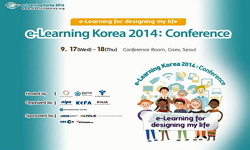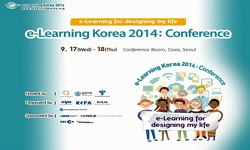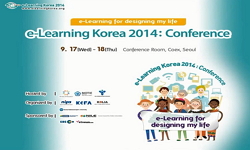The purpose of this study is to verify college students`` behavior intention to use online courses in Liberal Arts, based on the variables from Social Cognitive Theory(SCT), the Unified Theory of Acceptance and Use of Technology(UTAUT), and Theory of ...
http://chineseinput.net/에서 pinyin(병음)방식으로 중국어를 변환할 수 있습니다.
변환된 중국어를 복사하여 사용하시면 됩니다.
- 中文 을 입력하시려면 zhongwen을 입력하시고 space를누르시면됩니다.
- 北京 을 입력하시려면 beijing을 입력하시고 space를 누르시면 됩니다.

일반대학 교양과목에서 수행되는 이러닝에 대한 대학생의 수강의도에 영향을 미치는 요인 = Exploring Factors Influencing College Students` Behavior Intention of e-learning in Liberal Arts
한글로보기https://www.riss.kr/link?id=A99970400
- 저자
- 발행기관
- 학술지명
- 권호사항
-
발행연도
2014
-
작성언어
-
-
주제어
대학 ; 이러닝 ; 사이버강의 ; 수강의도 ; University ; e-learning ; online course ; behavior intention
-
KDC
300
-
등재정보
KCI등재
-
자료형태
학술저널
-
수록면
51-76(26쪽)
-
KCI 피인용횟수
12
- 제공처
-
0
상세조회 -
0
다운로드
부가정보
다국어 초록 (Multilingual Abstract)
The purpose of this study is to verify college students`` behavior intention to use online courses in Liberal Arts, based on the variables from Social Cognitive Theory(SCT), the Unified Theory of Acceptance and Use of Technology(UTAUT), and Theory of Planed Behavior(TPB). In this study, online courses self-Efficacy, effort expectancy, performance expectancy, social norm, and perceived behavioral control were considered as the exogenous variables, learner`s gender, grade, age, the total number of previous online courses that learner have already taken, the total number of connections(per semester), the total number of connections(per semester), and a total of access time(per semester) were considered as the moderating variables, and behavior intention to use online courses was considered as the dependent variable. To pursue the purpose of this study, data were collected by letting students who took the e-learning college liberal arts in A University, a total of 196 questionnaires were analyzed using the structural equation modeling method. The result of this study indicated three major findings. ① direct effect between performance expectancy, social norm and behavior intention, ② no direct effect between online courses self-Efficacy, effort expectancy, perceived behavioral control and behavior intention. ③ moderating effect of background variables. Based on the results of the study, theoretical and practical implications for e-learning in liberal arts are being discussed
참고문헌 (Reference)
1 박인우, "오프라인 대학의 온라인 교육 질 관리" 고등교육정책연구소 2013
2 송병호, "대학 이러닝 교양강좌의 학습자 만족도 및 효과성에 관한 연구" 한국교육공학회 29 (29): 241-261, 2013
3 정한호, "교사의 멀티미디어 교수자료 사용 의도에영향을 미치는 요인 연구 -기술수용모형을 중심으로-" 한국교육과정평가원 15 (15): 157-186, 2012
4 박인우, "고등교육 교육과정 지원체제 방안 연구" 교육과학기술부 2012
5 Anderson, N., "‘Because it’s boring, irrelevant and I don’t like computers’ : Why high school girls avoid professionally-oriented ICT subjects" 50 (50): 1304-1318, 2008
6 Sun, P., "What drives a successful e-Learning? An empirical investigation of the critical factors influencing learner satisfaction" 50 : 1183-1202, 2008
7 Sanchez-Franco, M. J., "WebCT-the quasimoderating effect of perceived affective quality on an extending technology acceptance model" 54 (54): 37-46, 2010
8 Shih, H., "Using a cognitive-motivation-control view to assess the adoption intention for Web based learning" 50 (50): 327-337, 2008
9 Venkatesh, V., "User acceptance of formation technology: toward a unified view" 27 (27): 425-478, 2003
10 Lau, S. H., "Understanding learner acceptance of learning objects : The roles of learning object characteristics and individual differences" 40 (40): 1059-1075, 2009
1 박인우, "오프라인 대학의 온라인 교육 질 관리" 고등교육정책연구소 2013
2 송병호, "대학 이러닝 교양강좌의 학습자 만족도 및 효과성에 관한 연구" 한국교육공학회 29 (29): 241-261, 2013
3 정한호, "교사의 멀티미디어 교수자료 사용 의도에영향을 미치는 요인 연구 -기술수용모형을 중심으로-" 한국교육과정평가원 15 (15): 157-186, 2012
4 박인우, "고등교육 교육과정 지원체제 방안 연구" 교육과학기술부 2012
5 Anderson, N., "‘Because it’s boring, irrelevant and I don’t like computers’ : Why high school girls avoid professionally-oriented ICT subjects" 50 (50): 1304-1318, 2008
6 Sun, P., "What drives a successful e-Learning? An empirical investigation of the critical factors influencing learner satisfaction" 50 : 1183-1202, 2008
7 Sanchez-Franco, M. J., "WebCT-the quasimoderating effect of perceived affective quality on an extending technology acceptance model" 54 (54): 37-46, 2010
8 Shih, H., "Using a cognitive-motivation-control view to assess the adoption intention for Web based learning" 50 (50): 327-337, 2008
9 Venkatesh, V., "User acceptance of formation technology: toward a unified view" 27 (27): 425-478, 2003
10 Lau, S. H., "Understanding learner acceptance of learning objects : The roles of learning object characteristics and individual differences" 40 (40): 1059-1075, 2009
11 Taylor, S., "Understanding information technology usage : A test of competing models" 6 (6): 144-176, 1995
12 Bhattacherjee, A., "Understanding information systems continuance : an expectation-confirmation model" 25 : 351-370, 2001
13 Barak, M., "Transition from traditional to ICT-enhanced learning environments in undergraduate chemistry courses" 48 (48): 30-43, 2007
14 Ajzen, I., "The theory of planned behavior" 50 (50): 179-211, 1991
15 Liao, H., "The role of experience and innovation characteristics in the adoption and continued use of e-learning websites" 51 : 1405-1416, 2008
16 Anderson, J. C., "Structural equation modelling in practice. A review and recommended two-step approach" 103 (103): 411-423, 1988
17 Segars, A. H., "Strategic information systems planning success : An investigation of the construct and its measurement" 22 (22): 139-163, 1998
18 Bandura, A., "Social foundations of thought and action: a social cognitive theory" Prentice-Hall 1986
19 Compeau, D. R., "Social cognitive theory and individual reactions to computing technology : A longitudinal study" 23 (23): 145-158, 1999
20 Armitage, C. J., "Social cognitive determinants of blood donation" 31 : 1431-1457, 2001
21 Bandura, A., "Self-efficacy: Thought control of action" Hemisphere 355-394, 1992
22 Joo, Y. J., "Self-efficacy for self-regulated learning, academic self-efficacy, and Internet self-efficacy in webbased instruction" 48 (48): 5-17, 2000
23 De Vries, H., "Self efficacy : The third factor besides attitudes and subjective norm as a predictor of behavioral intentions" 3 : 273-282, 1988
24 Goh, T. T., "SMS-based library catalogue system : A preliminary investigation of user acceptance" 27 (27): 394-408, 2009
25 Wang, A. Y., "Predictors of web-student performance : the role of self-efficacy and reasons for taking an on-line class" 18 : 151-163, 2002
26 Vijayasarathy, L. R., "Predicting consumer intentions to use on-line shopping: the case for an augmented technology acceptance model" 41 : 747-762, 2004
27 Davis, F. D., "Perceived usefulness, perceived ease of use and user acceptance of information technologies" 13 (13): 319-340, 1989
28 Ajzen, I., "Perceived behavioral control, self-efficacy, locus of control, and the theory of planned behavior" 32 : 665-683, 2002
29 Sánchez, R. A., "Motivational factors that influence the acceptance of Moodle using TAM" 26 (26): 1632-1640, 2010
30 Lee, B. C., "Learners’ acceptance of e-learning in South Korea: theories and results" 53 (53): 1-44, 2009
31 Liaw, S. S., "Investigating students’ perceived satisfaction, behavioral intention, and effectiveness of e-learning : a case study of the Blackboard system" 51 (51): 864-873, 2008
32 Moss, G, "Gender differences in website production and preference aesthetics : preliminary implications for ICT in education and beyond" 28 (28): 1362-3001, 2009
33 Fornell, C., "Evaluating structural equation models with unobservable and measurement error" 18 : 39-50, 1981
34 Ngai, E. W. T., "Empirical examination of the adoption of WebCT using TAM" 48 (48): 250-267, 2007
35 Khan, B., "Elements of e-learning"
36 Giannakos, M. N, "Educational webcasts’ acceptance : empirical examination and the role of experience" 44 (44): 125-143, 2013
37 Bentler, P. M., "EQS structural equations program manual" BMDP 1989
38 Maldonado, U. P. T., "E-learning motivation, students’acceptance/use of educational portal in developing countries: a case study of Peru" 1431-1441, 2009
39 Manstead, A. S. R., "Distinguishing between perceived behavioral control and self-efficacy in the domain of academic achievement intentions and behaviors" 28 : 1375-1392, 1998
40 Jung, Y., "Consumer adoption of mobile TV : examining psychological flow and media content" 25 (25): 123-129, 2009
41 Compeau, D. R., "Computer self-efficacy : development of a measure and initial test" 19 (19): 189-211, 1995
42 Taylor, S., "Assessing IT usage: The role of prior experience" 19 (19): 561-570, 1995
43 Chang, S. C., "An empirical investigation of students' behavioural intentions to use the online learning course websites" 39 (39): 71-83, 2008
44 Ajzen, I., "Action control: from cognition to behavior" Springer 11-39, 1985
45 Hsu, C. L., "Acceptance of blog usage : the roles of technology acceptance, social influence and knowledge sharing motivation" 45 (45): 65-74, 2008
46 지식경제부, "2012년 이러닝산업 실태조사" 2012
47 산업통상자원부, "2011-2012 이러닝백서" 2013
동일학술지(권/호) 다른 논문
-
초등 과학 수업에서의 팀 기반 학습모형이 학업 성취도와 정서지능에 미치는 효과
- 한국교육정보미디어학회
- 하채연 ( Che Yeon Ha )
- 2014
- KCI등재
-
예비교사를 위한 3차원 가상세계 역할놀이에서 학습자 간 상호작용에 관한 탐색적 연구
- 한국교육정보미디어학회
- 조영환 ( Young Hoan Cho )
- 2014
- KCI등재
-
대학 모바일러닝 수강의향에 영향을 주는 수강동기에 관한 연구
- 한국교육정보미디어학회
- 최미나 ( Mi Na Choi )
- 2014
- KCI등재
-
원격 평생교육에서 학습자 인식을 통한 원격기반 학점은행제 현황 분석
- 한국교육정보미디어학회
- 장선영 ( Sun Young Chang )
- 2014
- KCI등재
분석정보
인용정보 인용지수 설명보기
학술지 이력
| 연월일 | 이력구분 | 이력상세 | 등재구분 |
|---|---|---|---|
| 2026 | 평가예정 | 재인증평가 신청대상 (재인증) | |
| 2020-04-20 | 학회명변경 | 영문명 : Korea Association Of Educational Information & Broadcasting -> Korea Association for Educational Information and Media |  |
| 2020-01-01 | 평가 | 등재학술지 유지 (재인증) |  |
| 2017-01-01 | 평가 | 등재학술지 유지 (계속평가) |  |
| 2013-01-01 | 평가 | 등재학술지 유지 (등재유지) |  |
| 2010-01-01 | 평가 | 등재학술지 유지 (등재유지) |  |
| 2008-01-01 | 평가 | 등재학술지 유지 (등재유지) |  |
| 2005-01-01 | 평가 | 등재학술지 선정 (등재후보2차) |  |
| 2004-01-01 | 평가 | 등재후보 1차 PASS (등재후보1차) |  |
| 2003-01-01 | 평가 | 등재후보 1차 FAIL (등재후보1차) |  |
| 2001-07-01 | 평가 | 등재후보학술지 선정 (신규평가) |  |
학술지 인용정보
| 기준연도 | WOS-KCI 통합IF(2년) | KCIF(2년) | KCIF(3년) |
|---|---|---|---|
| 2016 | 1.59 | 1.59 | 1.95 |
| KCIF(4년) | KCIF(5년) | 중심성지수(3년) | 즉시성지수 |
| 2 | 1.96 | 2.299 | 0.35 |
연관 공개강의(KOCW)
-

2014 이러닝 국제 콘퍼런스: Analysis of e-Learning Program Management for Adults in Korea
한국교육정보진흥협회 Don-Min, Choi -

2014 이러닝 국제 콘퍼런스 : Understand Seniors’ Motivation in e-Learning through
한국교육정보진흥협회 Thomas Kuan -

2014 이러닝 국제 콘퍼런스 : Developing the PETAL e-Learning Platform~
한국교육정보진흥협회 Vincent Tam -

2014 이러닝 국제 콘퍼런스: Mobile Learning Design at the University of Manitoba
한국교육정보진흥협회 Dr. Robert Lawson -

2014 이러닝 국제 콘퍼런스 : The Moscow State University of Economics~
한국교육정보진흥협회 Vladimir Tikhomirov




 KCI
KCI KISS
KISS

